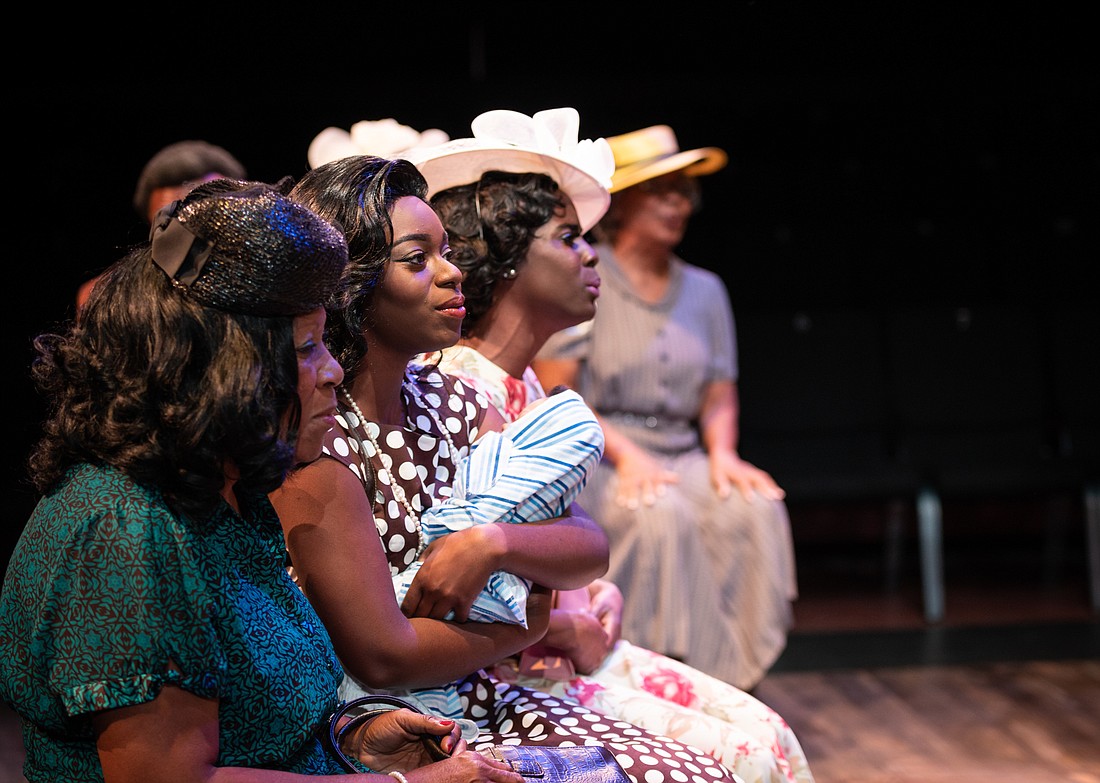- March 12, 2025
-
-
Loading

James Baldwin’s “The Amen Corner” is now holding services on the Westcoast Black Theatre Troupe stage. The action unfolds in an African-American storefront church in the Harlem of 1954.
The denomination isn’t specified. It’s clearly a fundamentalist congregation, though not rigidly so. They don’t hold to Paul’s prohibition that “Women should remain silent in the churches.” The pastor is a woman — Sister Margaret Alexander (Syreeta Banks). But the church does insist that: “An elder must be blameless.” This doctrinal point becomes a thorn in her side.
Margaret is the spiritual rock of her fellowship. Her judgment comes down hard as a rock. She calls out wayward believers — and they clearly chafe when she points the finger. She scolds Brother Boxer (Patric Robinson) for driving a liquor truck, and counsels a young mother (Khadija Sallet) to leave her non-believing husband. You soon discover that Margaret once practiced what she preaches.
Years ago, Margaret dumped her backsliding husband, Luke (Joel P. King), a trombonist who preferred jazz clubs to churches. She replaced her earthly love with the love of Jesus, and started the church. It’s been under her control ever since. The problem is: Margaret told the congregation that her husband left her. But the truth comes out. Luke returns like the prodigal son, and he’s dying of TB. Their 18-year-old son, David (Brian L. Boyd), has suppressed his dreams of following his father’s footsteps as a secular musician. Luke’s presence rekindles those dreams. He also lights a fire in the ambitious members of the congregation when they find out who dumped whom. Margaret’s not blameless after all. It’s the perfect excuse to kick her out, and put a new spiritual leader in charge.
Baldwin deftly captures the subculture of Harlem’s storefront churches. (He knew what he was talking about. He was the son of a preacher man who ran one. His act of teenage rebellion was to start his own storefront church when he was 14 years old.)
Director Chuck Smith creates a conversational, in-the-moment feel from Baldwin’s literary text. This is a warts-and-all glimpse of a slice of Christianity — not an attack, but not a commercial, either. Smith captures the infighting, but also the love. Elaine Mayo underscores the drama with excellent music direction. The production organically intersperses the action with hymns and spirituals. Some are part of Baldwin’s script; others are added for this production.
Banks’s Sister Margaret is a force of nature. She’s charismatic, and fills up the space of the tiny church with her larger-than-life presence. You can see how she got it started in the first place — and why a rebellion is brewing. This "Amen Corner" has four elders. Margaret has one in her corner — Sister Odessa (Yve Lyles), who happens to be her earthly sister. Three elders oppose her. Sister Moore (Sieglinda Fox) is Sister Margaret’s would-be replacement. Like Dana Carvey’s “Church Lady,” she wraps up pellets of poison in words of Christian love. Fox delivers a righteous performance. Moore has two elders on her side — Brother Boxer and his wife, (Ariel Blue). Robinson and Blue are excellent as this sycophantic couple. Boyd is affecting as David (who feels like a stand-in for Baldwin). His coming-of-age story means leaving the church. Khadija Sallet is also heartbreaking as a young mother who receives no miracle for her sick baby.
This church is a bubble of human connection in a sea of prejudice, indifference and poverty. Kudos to Michael Alan Stein for his lived-in mid-'50s costumes and Michael Newton Brown for his down-at-the-heels set. They create the perfect, wordless context for what this small storefront church means to the people who go there.
The play is a tragedy. For Margaret, it’s the tragedy of losing the church she built with her blood, sweat and tears. For the church, it’s the tragedy of losing this remarkable woman in a blind rush to judgment.
You root for reconciliation. It doesn’t happen.
Luke declares his undying love for Margaret on his deathbed. She realizes she never stopped loving him. She also realizes that loving the Lord shouldn’t mean hating your all-too-human brothers and sisters.
“To love the Lord is to love all His children — all of them, everyone! — and suffer with them and rejoice with them and never count the cost!’’
Amen. It’s a beautiful revelation. But it comes too late.